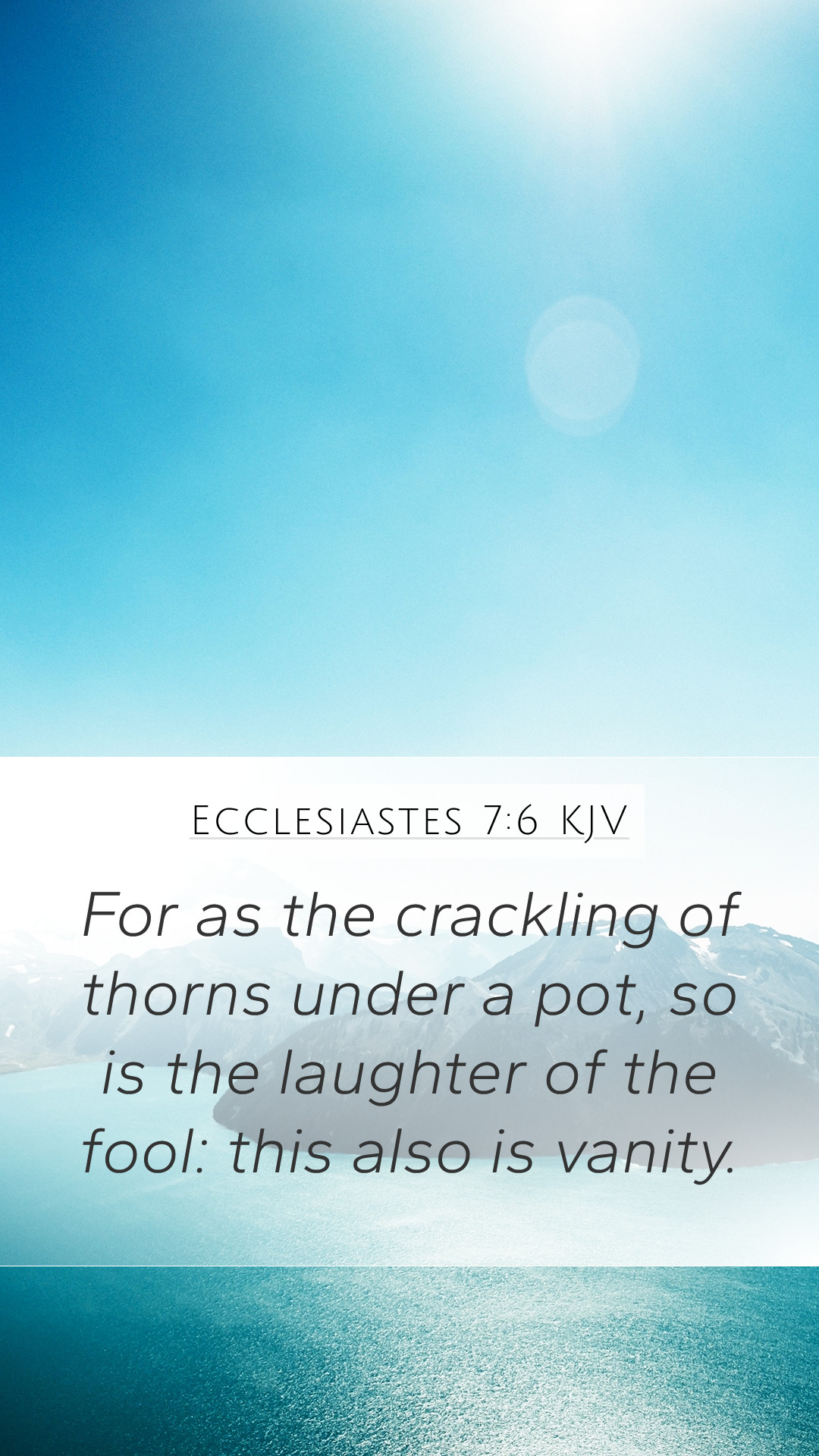Understanding Ecclesiastes 7:6
Ecclesiastes 7:6 states: "For like the crackling of thorns under a pot, so is the laughter of the fool: this also is vanity." This verse offers a profound insight into the nature of folly and the transient joy that often accompanies it.
Bible Verse Meanings
The verse presents a stark contrast between the superficial nature of laughter associated with foolishness and the deeper, more meaningful aspects of life. The reference to "the crackling of thorns under a pot" symbolizes a fleeting sound that may bring momentary warmth but quickly diminishes, illustrating how foolish laughter lacks substance and permanence.
Bible Verse Interpretations
- Matthew Henry: Henry elaborates on the emptiness of a fool's laughter, indicating that it is often loud and attention-seeking, yet ultimately hollow. He draws an analogy to the destructive nature of thorns, which are ultimately burned and leave nothing of value.
- Albert Barnes: Barnes emphasizes that true joy is rooted in wisdom and understanding, suggesting that laughter devoid of true insight is ultimately vain. He points out that while a fool may appear to enjoy life, it is a superficial enjoyment that leads to emptiness.
- Adam Clarke: Clarke focuses on the imagery of thorns’ crackling as a metaphor for the brief and unsatisfying pleasure derived from folly. He interprets this as a caution against the fleeting nature of earthly pleasures that are not grounded in wisdom or righteousness.
Bible Study Insights
This verse invites deeper reflection during bible study groups or online bible study sessions, challenging participants to analyze the difference between true wisdom and foolishness. It serves as a powerful reminder that not all that brings pleasure should be pursued.
Understanding Scripture
To fully grasp the meaning of this scripture, one must consider the historical context of Ecclesiastes, traditionally attributed to King Solomon, who reflects on the nature of life, joy, and human folly. The verse serves as a cautionary tale regarding the pursuit of empty pleasures at the expense of wisdom and meaningful living.
In-depth Bible Verse Analysis
In-depth analysis reveals the psychological implications of foolishness. Those who pursue laughter and entertainment as an escape often do so from a place of discontent or ignorance. The writer of Ecclesiastes points out that such pursuits are ultimately unfulfilling.
Application of Bible Verses to Daily Life
In today’s culture, where social media often amplifies the laughter of the foolish, this verse becomes increasingly relevant. It urges modern readers to seek lasting joy through wisdom, understanding, and genuine relationships rather than the fleeting satisfaction derived from hollow entertainment.
Biblical Exegesis
The exegesis of this verse calls for a deeper understanding of what constitutes foolishness versus wisdom in biblical terms. It encourages believers to evaluate their own lives and question the sources of their joy and laughter.
Related Bible Cross References
- Proverbs 14:13: "Even in laughter the heart may sorrow, and the end of mirth may be grief."
- Ecclesiastes 2:2: "I said of laughter, 'It is mad'; and of mirth, 'What does it accomplish?'"
- Proverbs 17:22: "A merry heart does good, like medicine, but a broken spirit dries the bones."
Conclusion
In summary, Ecclesiastes 7:6 serves as a timeless reminder of the importance of pursuing true wisdom and genuine joy. Understanding this Bible verse requires careful consideration of the contrasts it illustrates and encourages readers to reflect on their own lives and the sources of their happiness.


